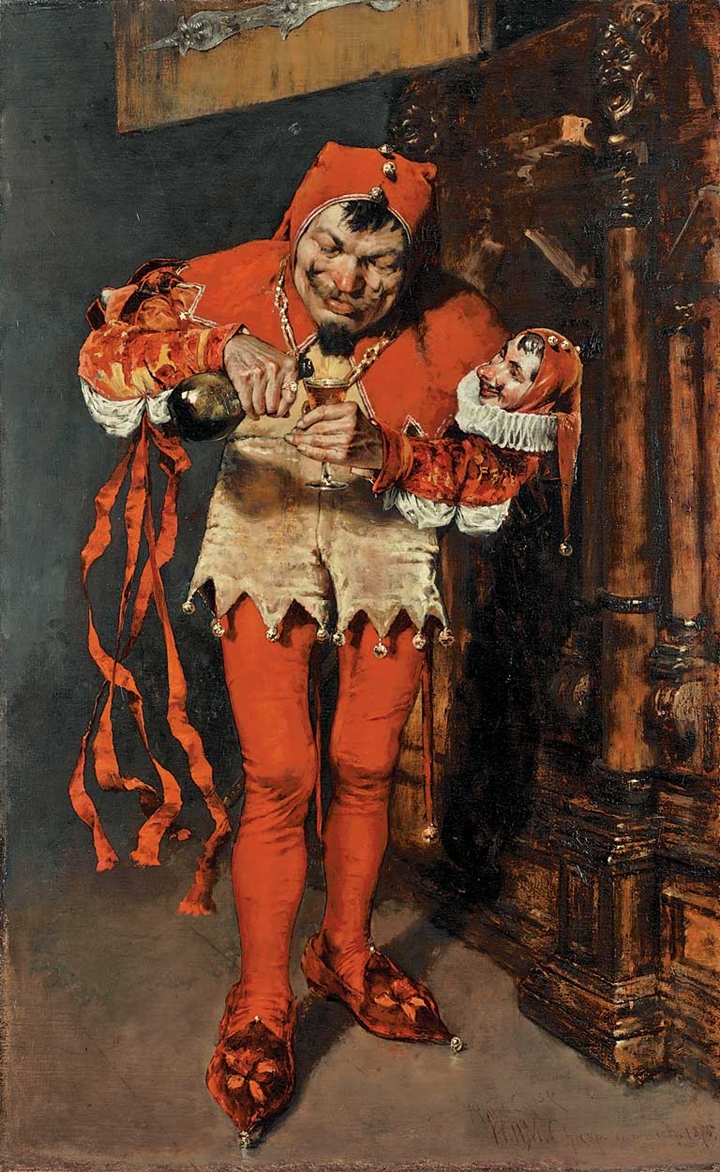

| Jester's special abilities | Weapons and armor | Magic items | Henchmen and hirelings | Magic spells |
| Dragon | Classes | - | Best of Dragon, Vol. IV | Dragon 60 |
Q. What is the 'jester'
mentioned in
issue 11 of IMAGINE magazine?
A .The jester is one
of the new, Official
character classes that we
haven't
seen yet -- and possibly
the replacement
for the bard. The
character
classes which were planned
are the
jester, savant
(a wizard subclass),
mystic (a priest subclass),
mountebank
(a thief variant) and the
Grand Druid (a 15th level
green
fingered genius).
(Imagine #15)
1. SUBCLASS =
2. SOCIAL CLASS MINIMUM
=
3. ABILITY SCORE MINIMUMS
STRENGTH
= 6
INTELLIGENCE
= 12*
WISDOM
= 12*
DEXTERITY
= 9*
CONSTITUTION
=
CHARISMA
= 13
COMELINESS
=
4. POSSIBLE RACES &
MAX. LEVEL ATTAINABLE = h.U, he.U, g.U. ha3, d3, e3.
5. MULTI-CLASS POSSIBILITIES
=
6. HIT DIE TYPE = d6
7. MAXIMUM NUMBER OF HIT
DICE = 10
8. SPELL ABILITY = yes
9. ARMOR PERMITTED = leather
10. SHIELD PERMITTED = small
shields
11. WEAPONS PERMITTED =
club, dagger, scimitar, sling, stave, sword (short, long, broad)
12. OIL PERMITTED =
13. POISON PERMITTED = yes
(almost never but under the most extreme circumstances)
14. ALIGNMENT = NG, CG,
TN, or CN.
15. STARTING MONEY =
16. WEAPON PROFICIENCIES
= 2 (5th, 9th, etc.)
17. NON-PROFICIENCY PENALTY
= -3
18. NON-WEAPON PROFICIENCIES
= <?>
19. STARTING AGE = <?>
20. COMBAT = thief
21. SAVING THROWS = thief
+1
22. MAGIC ITEMS = magic
leather armor, magic small shields, magic weapons
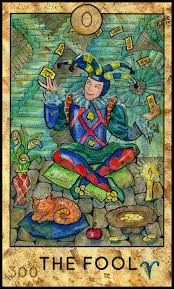
Summary:
* +1 initiative
* raise/lower morale (+10/-10)
* immune to insanity
* ventriloquism, at will
* evade blows (x2 Dex bonus)
* L16: read scrolls as thief
Note: The following is the
version from Best of Dragon IV.
(The
following is the version from Dragon #60, to be microscopically precise.)
Jesters are adventurous NPCs
with an overwhelming sense of the absurd.
They roam from place to
place, telling tales, pulling practical jokes, insulting the most fearsome
of monsters and characters, and generally making nuisances of themselves.
Because of their outlook
on the world and their special powers, they may prove potentially useful
(or annoying) to adventuring parties.
Only humans,
half-elves, and gnomes have unlimited advancement in this class.
Halflings, dwarves, and
elves may become jesters, but can only progress to 3rd level (Clown).
Halflings and dwarves have
great difficulty in casting the magical spells that jesters thrive upon,
and dwarves tend to be too
serious to make a living at acting silly (which is a pity).
Elves find it hard to poke
fun at people on a lifelong basis.
Since half-orcs and their
kin all think things like thumb screws and iron maidens are marvelously
comic (feelings not shared by many other people), they may not become jesters.
Half-elves can advance without
limit because they are able to draw from human and elven comedy and thus
have a richer sense of humour.
Gnomes
are more adventurous on the whole than halflings are, can cast magical
spells, and are more mischievous as well; thus, they can progress much
further than the latter race.
A jester must be either NG,
CG,
TN,
or CN.
The INT && WIS scores
of
a jester must each be at
least 12, charisma
must be at least 13, and
dexterity must be 9
or better.
Jesters with I, W, and D
scores
all of 16 or higher gain
a 10% bonus to earned XP.
Charisma, in the case of
a jester, refers
primarily to his || her
skill in drawing
attention and not to physical
appearance,
which may vary widely. Jesters
tend to be
smaller than the average
height of their race.
The jester class cannot be
combined with
any other class at any time
by the same
character. Any change from
the jester's
alignment immediately makes
the jester a
thief with only climbing
and pickpocketing
thieving skills. If he or
she changes or is
changed back to the former
alignment or
another acceptable one,
the character may
resume play as a jester
after a rest of one
month of game time.
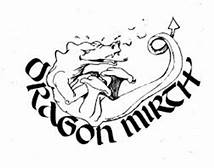
Jester's HD are six-sided,
and
they may have as many as
10 HD. Beyond
10th level, the jester gets
two additional HP
per level.
Jesters' special
abilities
1. One
new language, over and above
those already allowed to
the jester NPC
because of INT, may be learned
at
each odd-numbered level
of experience,
incl. first level. To reflect
the jester's
naturally strange mind,
the new language
may (if the DM desires)
be rolled randomly
from the table
on p. 102 of the DMG,
re-rolling if the resulting
language is
already known.
2. Due
to outrageous mannerisms and
peculiar dress, jesters
gain a +1 on initiative
die rolls in combat situations
with all types
of opponents (who are assumed
to be
too stunned or surprised
to react quickly).
3. Jesters
save on the thief table, with a
+ 1 on all saves to account
for their extremely
good luck.
4. Jesters
can climb walls and other rough
vertical surfaces with a
base of 75% chance
of success. This chance
improves 2% for
each level thereafter to
a max. chance
of 99%. Racial and DEX bonuses
for
climbing, from p. 16 of
the PH,
are applicable to jester
NPCs.
5. From the third level onward,
jesters
may pick pockets as well
as does a thief of
two levels lower. Racial
and dexterity
bonuses apply to this ability
as well.
6. Being
the masters of wit and insult that
they are, jesters may raise
the morale of
friendsand lower the morale
of enemies
within a 60-foot raidus
of the jester. The
morale score alteration
is either + 10% or
- 10 %, depending on whether
the listener is
an ally or an enemy. There
is no saving
throw against this ability.
A jester who is
engaged in altering the
local morale conditionis
can perform other actions
at the same
time, like fighting, climbing,
running, etc.
Morale is altered through
the skillful use of
loud vocal commentary and
hand gestures;
thus, silence, paralysis,
hold,
and other
related spells can preent
morale alteration
if used successfully against
the offending
jester. The morale effects
begin immediately
after one round of verbal
and somatic communication
by the jester, and continue
for
as long as the jester cares
to keep it up (to a
max. of 6 turns, when he
or she gets
hoarse) plus 2-8 turns thereafter.
Only those creatures able
to understand
what the jester is saying
will be affected. A
jester who insults orcs
in the hill giant
tongue will have no effect
on their morale,
but a hill giant behind
the orcs, if within
60', will certainly be affected.
In the same
situation, if another NPC
was within 60' of teh
jester, was allied with
the jester, and
understood the hill giant
language, he
would ave an improved morale
score at the
same time the hill giant's
morale is lowered.
If the hill giant fails
a morale check, he will
leave (ears burning) and
not return for at
least 20 minutes.
7. Jesters of any level are
immune to
insanity of any sort (no
matter what
else thinks). This does
not include confusion
spells and the like.
8. Jesters are accustomed
by TRADE to
juggling small objects and
doing tricks with
them. This experience has
an important
side effect. Any time a
jester is aware that a
small grenade-like object,
dagger or dart
has been tossed within 10'
of him or her,
there is a base 80% chance,
+1% per level
of the jester to a max.
of 99%, that the
jester can successfully
catch teh item in
question and immed. (in
the same
segment) toss it back in
the direction it
came from. The jester cannot
do anything
else in that ruond, but
may do this up to
three times in a round if
necessary. Only
objects up to 10 gp (one
pound) in wieght
may be caught in this manner.
The category
of grenade-like objects
could incl. vials of
poison, flaming bottles
of oil, acid grenades,
or the third form of the
Otiluke's
freezing
sphere
spell. Even a poisoned dagger may
be safely grasped if the
jester catches it,
provided the hilt itself
is not poisoned. The
jester will not be struck
by the item if he or
she misses, unless the caster
had made a
successful "to hit" score
in the first place. If
the jester catches a dagger
or dart but has
no expertise with the weapon,
it can be
thrown back but will carry
a non-proficiency
penalty on its chance to
score a
hit. To perform this action,
the jester must
have at least one hand free
and cannot be
wearing any sort of glove
or hand covering.
9. At the 16th level of experience
and
above, a High Jester is
also known as a
Prince of Fools. He or she
then gains the
power to read and utilize
scrolls of a magic-user
or illusionist nature, with
the same
degree of skill as a 10th-level
thief. The
same chances for causing
the spell to be
misunderstood or backfire
are present;
however, if the spell backfires,
there is only
a 10% chance that it will
adversely affect
the jester casting it. (Other
people nearby
may not be so fortunate.)
10. Jesters are so skilled
at casting their
voices (most commonly when
using mannequins)
that they function as if
they had a
permanent ventriloquism
spell, though this
ability is not magical.
The range of this
ability is a 1" radius around
the jester (10'
indoors and 30' outdoors).
As with the
spell, the jester may change
his or her voice,
make different sorts of
noises, and so on, so
long as the noises are something
that could
conceivably be made vocally.
There is a
10% chance per point of
intelligence that
each listener has above
the intelligence of the
jester that the ruse will
be discovered.
This chance may be rolled
once per round
when the ventriloquism ability
is used.
11. Acrobatics and tumbling
are commonly
used by jesters in their
shows. These
skills come in handy in
combat situations. A
jester may opt to evade
a blow from a hand-held
weapon in combat by twisting
out of
the weapon's way. If the
jester elects to do
this, his usual dexterity
bonus for AC
is doubled for that round.
Thus, a
jester with a 17 Dex who
normally
gains a -3 AC bonus would
gain a -6 AC
bonus during the round he
was evading
attacks. Any number of attacks
made in
that round may be so evaded.
However, this
special bonus does not apply
against any
thrown or hurled missiles,
and the jester
cannot attack, climb, or
perform other
actions in the same round.
The jester may
elect to evade attack if
he loses initiative in a
round, but must make this
declaration
immed. after the initiative
roll.
200,000 XP per level for
each additional level beyond the 14th.
Jesters gain 2 HP per level
after the 10th.
| Jester
level |
New
languages |
Climb
walls |
Pick
pockets |
Catch
object |
1 | 2 | 3 | 4 | 5 | 6 | 7 | 8 |
| 1 | 1 | 75% | -- | 81% | -- | -- | -- | -- | -- | -- | -- | -- |
| 2 | 0 | 77% | -- | 82% | 1 | -- | -- | -- | -- | -- | -- | -- |
| 3 | 1 | 79% | 30% | 83% | 2 | -- | -- | -- | -- | -- | -- | -- |
| 4 | 0 | 81% | 35% | 84% | 2 | 1 | -- | -- | -- | -- | -- | -- |
| 5 | 1 | 83% | 40% | 85% | 3 | 2 | -- | -- | -- | -- | -- | -- |
| 6 | 0 | 85% | 45% | 86% | 3 | 2 | 1 | -- | -- | -- | -- | -- |
| 7 | 1 | 87% | 50% | 87% | 4 | 3 | 2 | -- | -- | -- | -- | -- |
| 8 | 0 | 89% | 55% | 88% | 4 | 3 | 2 | 1 | -- | -- | -- | -- |
| 9 | 1 | 91% | 60% | 89% | 4 | 4 | 3 | 2 | -- | -- | -- | -- |
| 10 | 0 | 92% | 65% | 90% | 4 | 4 | 3 | 2 | 1 | -- | -- | -- |
| 11 | 1 | 93% | 70% | 91% | 4 | 4 | 4 | 3 | 2 | -- | -- | -- |
| 12 | 0 | 94% | 80% | 92% | 4 | 4 | 4 | 3 | 2 | 1 | -- | -- |
| 13 | 1 | 95% | 90% | 93% | 4 | 4 | 4 | 4 | 3 | 2 | -- | -- |
| 14 | 0 | 96% | 100% | 94% | 4 | 4 | 4 | 4 | 3 | 2 | 1 | -- |
| 15 | 1 | 97% | 105% | 95% | 4 | 4 | 4 | 4 | 4 | 3 | 2 | -- |
| 16 | 0 | 98% | 110% | 96% | 4 | 4 | 4 | 4 | 4 | 3 | 2 | 1 |
| 17 | 1 | 99% | 115% | 97% | 4 | 4 | 4 | 4 | 4 | 4 | 3 | 2 |
| 18 | 0 | 99% | 125% | 98% | 4 | 4 | 4 | 4 | 4 | 4 | 4 | 3 |
| 19 | 1 | 99% | 125% | 99% | 4 | 4 | 4 | 4 | 4 | 4 | 4 | 4 |
Weapons
and armor
Jesters
may only wear leather armor, but
they may employ small shields
of any sort in
combat. They tend to dress
in bright colors.
The only weapons permitted
to jesters are
clubs, daggers, scimitars,
slings, staves, and
swords (either short, long,
or broad
swords). Oil may be used
as a weapon, but
jesters will almost never
use poison under
any circumstances except
the most extreme.
Too frequent use of poison
changes a jester's
alignment to evil irrevocably.
Jesters attack
on the thief's combat table,
but have none
of the thief's benefits
on backstabbing opponents.
Two weapons may initially
be chosen
by a jester character at
first level. The non-proficiency
penalty is -3, and a new
weapon
is gained for every four
levels of experieince
beyond the first (5th, 9th,
etc.)
Magic items
Magic leather armor, magic
small shields,
and magic weapons of the
permitted types
may be employed by jester
characters. Only
those magic items usable
by all character
classes and restricted to
none may also be
used by a jester.
![]()
At the DM's option, jesters
may have several special
magical items that
can be used only by the
jester class. Other
character classes attempting
to make use of
these items may suffer minor
damage, a
mild form of insanity or
confusion, or some
effect of a comic nature.
The DM
is left to his or her own
best judgement
and creativity in coming
up with such
items and their potentially
useful or debilitating
effects. Imagine the uses
of the Nose of Bozo,
the Arrow of Steve Martin,
or the
dreaded Tome of Henny
Youngman.

A wand
of wonder, by the way, is often a
jester's most prized possession.
For some
strange reason, such wands
do not use up
charges when used by jesters,
so they have
an effectively infinite
lifespan in a jester's
hands. A jester also has
a 5% chance per
level or controlling the
wand's output -- not
that this makes the wand
any safer or more
useful to anyone but the
jester.
Henchmen
and hirelings
Jesters may take into service
any sort of
standard
hireling as listed in the DMG,
with the exception of any
lawful or evil characters.
Henchmen may be
taken at any level and may
be any character
except paladins, assassins,
monks, and any
other lawful or evil characters.
jesters do
not normally establish castles
or citadels,
and won't attract any followers
even if they
do. They can give performances
at arenas
in any city, as well as
spontaneous shows at
any street corner; payment
by local crowds
should be determined by
the DM. A jester
of ninth level or more may
establish a "fun
house" or carnival to attract
bigger crowds
and make more money; details,
again
should be worked out by
the DM.
Magic spells
By dint of studious application,
their
warped personalities, their
exceptional
verbal skills, and lots
of luck, jesters may
commit to memory a small
number of
magic spells normally usable
by magic-uers,
druids, or illusionists.
All the jester's
spells are of the enchantment/charm
variety,
and there is a 1% chance
per level of a spell
that it will misfire each
time it is used and
have no effect, since jesters'
minds weren't
well made for storing spells.
Jesters must
research spells they wish
to know (and may
invent new ones if they
desire). Upon learning
each new spell, a jester
is able to record
it in a special spell book
that cannot be used
by anyone but another jester,
so he or she
can relearn the spell after
it is cast. This is
very much like the way in
which rangers
learn and use their magic-user
spells. Jesters
can cast their spells while
wearing leather
armor. A complete list of
spells follows,
though the DM may include
other
enchantment/charm spells
as well.
First level
1. animal
friendship (D)
2. charm
person (M)
3. friends
(M)
4. hypnotism
(I)
5. sleep
(M)
Second level
1. forget
(M)
2. ray
of enfeeblement (M)
3. scare
(M)
4. trip
(D)
Third level
hold
animal (D)
hold
person (M)
suggestion
(M)
Fourth level
charm
monster (M)
confusion
(M)
fumble
(M)
Fifth level
feeblemind
(M)
hold
monster (M)
Sixth level
mass
suggestion (I)
Seventh level
mass
charm (M)
Eighth level
Otto's
irresistible dance (M)
Jester Table II shows the
levels at which a
jester may gain new spells
and how many
spells the jester may cast
per day. Jester
NPCs will use these spells
to best possible
advantage in causing the
most amusing
situations that can be imagined
by the DM.
Only in times of great danger
or duress will
the jester use these spells
with an intent to
cause real harm.
If cantrips (0-level MU and
illusionist
spells) are used in a campaign,
a
jester may learn to use
them. A 1st level
jester can use two cantrips
per day, and may
gain the ability to cast
an extra cantrip with
every new level gained thereafter.
A jester
often uses these minor spells
as part of his
sideshow, though they may
also have some
very important and surprising
uses during
an adventure.
Q: The jester NPC
class (issue #60) seems
to allow certain races like
dwarves and
halflings to get the ability
to cast magical
spells they could not normally
use.
A: Jesters were designed
to be unusual
NPCs; however, if a DM finds
some of
their abilities to be too
unusual, then of
course some changes in the
class may be
made. DMs might consider
having only
humans and gnomes be jesters
if they
wish to restrict the class
only to those
beings who can use illusionist
magic,
possibly including half-elves
if one
wanted to stretch it a bit,
but this is all up
to the DM.
Q: Also,
some races
are noted in the Players
Handbook as being
able to learn only a
few extra languages due
to their intelligence,
while jester NPCs are supposed
to
gain a new language every
other level.
A: As for the second
question,
there are other character
classes like
druids and bards who are
able to learn a
number of languages over
and above any
racial or intelligence limits;
the jester is
free to do so, too, by the
same token.
(79.16)
ROGUES' GALLERY: JESTERS
zb
11 | Crazy Chester (enchanter 17; 92.714)
10 | Boiyung (elf smuggler 11; 92.686)
9.
8.
_-_Nationalmuseum_-_18637.tif.jpg)
7.
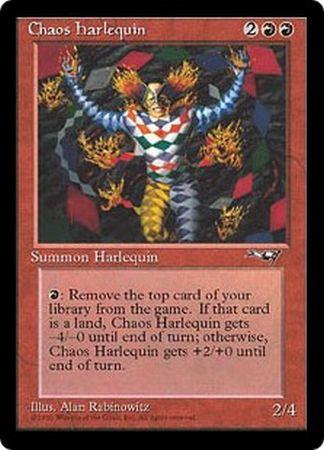
6. <replace: no goblin jesters>
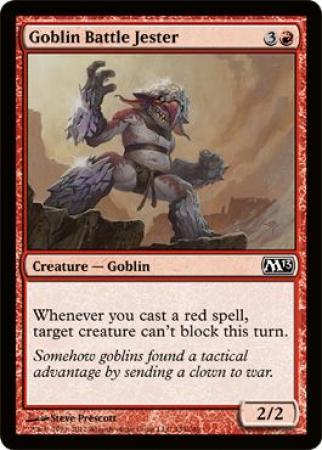
5.
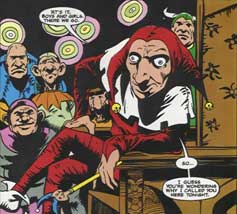
4.
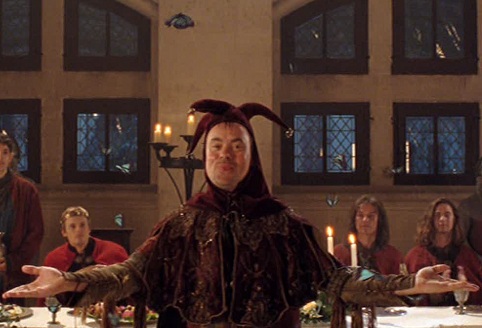
3.
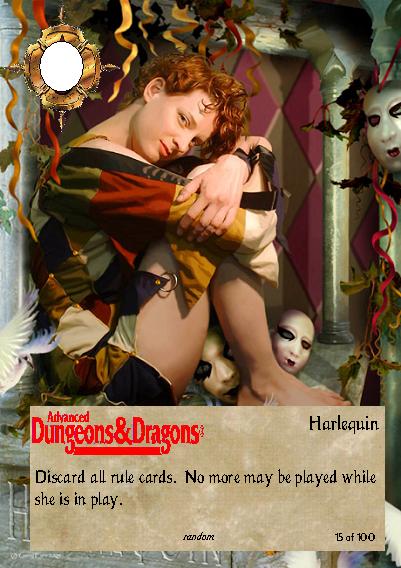
2. <what kind of undead?>
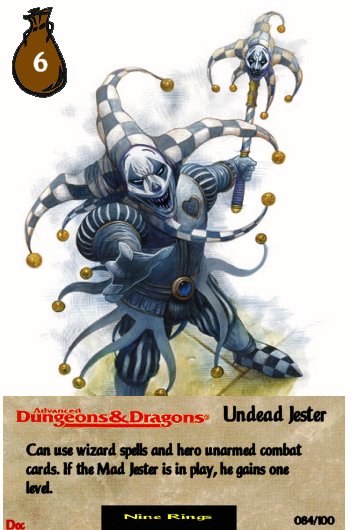
1. <edit: no mad jesters>
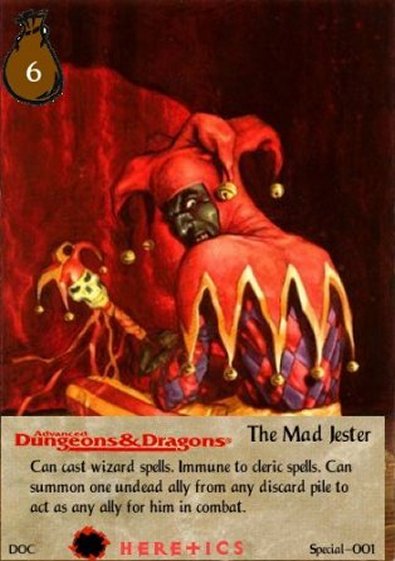
Quote:
Originally Posted by Barak
And that's exactly what
I meant by forthcoming typos. Obviously, by "appaled", Gary meant "agreeing".
What can I say. I love dwarves,
I hate elves, and I'm human. ![]()

Dwarven jesters have small
wit <EEK!>
Heh,
Gary
Comments
:confused: Is that
a pun?!?! :D
who? Gary? pun???
nawwww. (power xp number 8 or 9)
The Jester
A comical, clever,
charismatic NPC
by Roger Moore
Jesters are adventurous non-player characters <NPCs> with an overwhelming sense of the absurd.
<
I12+
W12+
D9+
CH13+
if I & W & D = 16+, then +10% XP
1. DMG.102
2. +1 init
3. save as thief +1
4. climb walls (apply race & dex modifiers, from PH.16)
5. pick pockets (see table)
6. raise/lower morale (language-dependent, range 60'r, duration: concentration
[up to 6 turns] + 2-8 turns) : +10% or -10%
7. immune = insanity
8. Juggling (Catch object) : as OA proficiency. toss back projectiiles,
up to 1#, (attack of opportunity)
9. L16 = Prince of Fools : may read or use MU or I scrolls, as a L10
thief. However, only a 10% chance of an adverse effect on the jester, if
the scroll backfires.
10. Ventriloquism (range 1" - 10' indoors, 30' outdoors). 10% chance
per point of listener intelligence above the jester's intelligence that
the ruse will be discovered.
11. Acrobatics = double dexterity bonus for the round.
[12.] A jester has a 5% chance per level of controlling a wand of wonder's output.
>
JESTER TABLE I
| Experience Points | Experience Level | 6-sided dice for
accumulated hit points |
Level title | Weapon
proficiencies * |
| - | - | - | - | |
| 0 -- 1,100 | 1 | 1 | Wit | 2 |
| 1,101 -- 2,200 | 2 | 2 | Comic | - |
| 2,201 -- 4,500 | 3 | 3 | Clown | - |
| 4,501 -- 9,000 | 4 | 4 | Buffoon | - |
| 9,001 -- 18,000 | 5 | 5 | Joker | 3 |
| 18,001 -- 36,000 | 6 | 6 | Trickster | - |
| 36,001 -- 66,000 | 7 | 7 | Harlequin | - |
| 66,001 -- 106,000 | 8 | 8 | Merryandrew | - |
| 106,001 -- 160,000 | 9 | 9 | Jester | 4 |
| 160,001 -- 250,000 | 10 | 10 | High Jester | - |
| 250,001 -- 450,000 | 11 | 10 + 2 | High Jester (11th) | - |
| 450,001 -- 650,000 | 12 | 10 + 4 | High Jester (12th) | - |
| 650,001 -- 850,000 | 13 | 10 + 6 | High Jester (13th) | 5 |
| 850,001 -- 1,050,000 | 14 | 10 + 8 | High Jester (14th) | - |
200,00 experience points per level for each additional level beyond
the 14th.
Jesters gain 2 hit points <HP> per level after the 10th.
* -3 non-proficiency penalty
JESTER TABLE II
| Jester
level |
New
languages |
Climb
walls |
Pick
pockets |
Catch
object |
0 | 1 | 2 | 3 | 4 | 5 | 6 | 7 | 8 |
| - | - | - | - | - | - | - | - | - | - | - | - | - | |
| 1 | 1 | 75 | - | 81 | 2 | - | - | - | - | - | - | - | - |
| 2 | 0 | 77 | - | 82 | 3 | 1 | - | - | - | - | - | - | - |
| 3 | 1 | 79 | 30 | 83 | 4 | 2 | - | - | - | - | - | - | - |
| 4 | 0 | 81 | 35 | 84 | 5 | 2 | 1 | - | - | - | - | - | - |
| 5 | 1 | 83 | 40 | 83 <> | 6 | 3 | 2 | - | - | - | - | - | - |
| 6 | 0 | 85 | 45 | 86 | 7 | 3 | 2 | 1 | - | - | - | - | - |
| 7 | 1 | 87 | 50 | 87 | 8 | 4 | 3 | 2 | - | - | - | - | - |
| 8 | 0 | 89 | 55 | 88 | 9 | 4 | 3 | 2 | 1 | - | - | - | - |
| 9 | 1 | 91 | 60 | 89 | 10 | 4 | 4 | 3 | 2 | - | - | - | - |
| 10 | 0 | 92 | 65 | 90 | 11 | 4 | 4 | 3 | 2 | 1 | - | - | - |
| 11 | 1 | 93 | 70 | 91 | 12 | 4 | 4 | 4 | 3 | 2 | - | - | - |
| 12 | 0 | 94 | 80 | 92 | 13 | 4 | 4 | 4 | 3 | 2 | 1 | - | - |
| 13 | 1 | 95 | 90 | 93 | 14 | 4 | 4 | 4 | 4 | 3 | 2 | - | - |
| 14 | 0 | 96 | 100 | 94 | 15 | 4 | 4 | 4 | 4 | 3 | 2 | 1 | - |
| 15 | 1 | 97 | 105 | 95 | 16 | 4 | 4 | 4 | 4 | 4 | 3 | 2 | - |
| 16 | 0 | 98 | 110 | 96 | 17 | 4 | 4 | 4 | 4 | 4 | 3 | 2 | 1 |
| 17 | 1 | 99 | 115 | 97 | 18 | 4 | 4 | 4 | 4 | 4 | 4 | 3 | 2 |
| 18 | 0 | 99 | 125 | 98 | 19 | 4 | 4 | 4 | 4 | 4 | 4 | 4 | 3 |
| 19 | 1 | 99 | 125 | 99 | 20 | 4 | 4 | 4 | 4 | 4 | 4 | 4 | 4 |
All jester spells are enchantment/charm : whenever cast, they have a 1% chance per level of backfiring.
If cantrips (0-level magic-user and illusionist spells) are used in
a campaign,
a jester may learn to use them .
A 1st-level jester can use two cantrips per day,
and may gain the ability to cast an extra cantrip with every new level
gained thereafter.
First level
[animal friendship] (D)
[charm person] (M)
[friends] (M)
[hypnotism] (I)
[sleep] (M)
Second level
[forget] (M)
[ray of enfeeblement] (M)
[scare] (M)
[trip] (D)
Third level
[hold animal] (D)
[hold person] (M)
[suggestion] (M)
Fourth level
[charm monster] (M)
[confusion] (M)
[fumble] (M)
Fifth level
[feeblemind] (M)
[hold monster] (M)
Sixth level
mass suggestion (I)
Seventh level
[mass charm] (M)
Eighth level
[otto's irresistible dance] (M)
A jester was seeking a rhyme
To placate his lord for a time.
He joked of undead
And kept wearing his head.
A lich in line saves mime.
-- Toni Leigh Perry
Jester adjustments
Dear Editor:
The article in DRAGON #60 about elves
was
superb, as were the sections on alignment
and cantrips. Then came a new NPC class, the
Jester. I thought the Jester was very well
done, but I found three mistakes.
First, on Table I, the experience level is ten
levels higher for the first ten categories than it
should be. A simple typographical error, but
still . . .
Second, according to the article half-orcs
may achieve 4th level — but this is wrong. In
order to become a Jester, a charisma of 13 or
greater is needed, and no half-orc may possess
a charisma rating higher than 12 (see
Character Race Table III, page 15,
PH).
Finally, Jesters gain spell power as they
advance in level. Unfortunately, halflings and
dwarves may advance to respectable level,
thus gaining the ability to cast spells of a magical
nature. This is a power specifically prohibited
to either race. I find this particularly
ironic because Mr. Moore (the author) once
wrote, “Dwarves do not use any
magical
spells . . .” (DRAGON #58, page 25).
All told, I still have great respect for Mr.
Moore’s writing skills, as I do for all the contributing
authors to your magazine.
Richard Falkenrath, Jr.
Little River, Calif
(Dragon #65)
We plead guilty to the first count, Richard. It
was indeed a “simple” typesetting error; call it
nine errors, if you want to get particular, but
don’t blame us for ten of ‘em. The level
numbers 11-19 at the top of the experience
point chart should be 1-9, obviously — but
level 10 is supposed to be level 10.
However, I think we can debate your second
and third complaints. Neither the author
(Roger Moore) nor the editor (me) thought
about the half-orc’s charisma limit before the
article was printed — but remember that the
limit of 12 does not apply to other half-orcs,
and a half-orc’s charisma with respect to others
of the same race can be higher than that.
(See pages 16-17, PH.)
<Half-Orc
CHA>
<Dwarven
CHA>
A DM who wants to
use a half-orc jester NPC could justify it by
allowing the character to meet the charisma
qualification as long as the character’s pregenerated
score for that ability is 13 or higher.
I can’t explain the final “mistake” you pointed
out by referring to a rule book, but I can ask
you to accept the “fact” that the jester, as
presented in that article, is a unique character
class, and dwarves and halflings who are
members of that class are likewise unique in
their ability to manipulate (however inefficiently
and unpredictably) some of the forces
of magic. As support for that line of reasoning,
I offer this month’s edition of “From the
Sorceror’s Scroll” (page 9), wherein Gary
Gygax describes his concept of a jester
as a
character — which can be human, gnome, or
halfling — with “some magic-user spells and
illusionist magic.” If both he and we have
made a “mistake,” then at least we’re in good
company.
— KM
(Dragon #65)